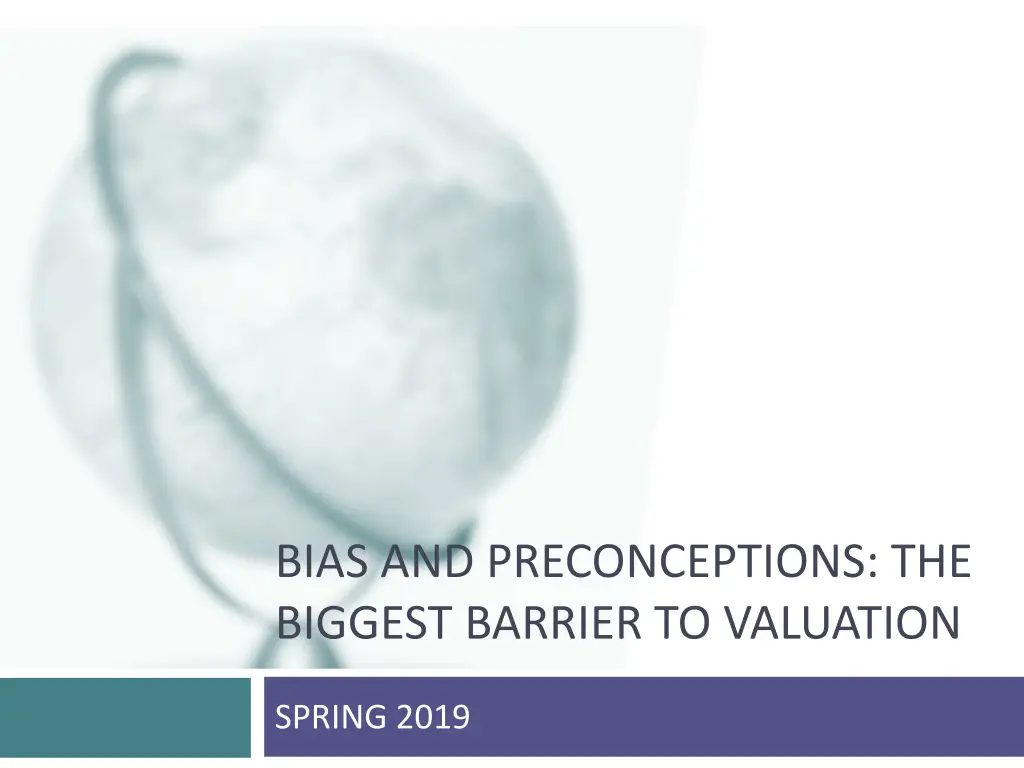
Understanding Bias and Preconceptions in Valuation
Explore the impact of bias and preconceptions on valuation in various scenarios, from personal assessments to professional equity research and M&A activities. Learn how subconscious factors influence decision-making and the importance of recognizing and mitigating bias in valuation processes.
Download Presentation

Please find below an Image/Link to download the presentation.
The content on the website is provided AS IS for your information and personal use only. It may not be sold, licensed, or shared on other websites without obtaining consent from the author. If you encounter any issues during the download, it is possible that the publisher has removed the file from their server.
You are allowed to download the files provided on this website for personal or commercial use, subject to the condition that they are used lawfully. All files are the property of their respective owners.
The content on the website is provided AS IS for your information and personal use only. It may not be sold, licensed, or shared on other websites without obtaining consent from the author.
E N D
Presentation Transcript
BIAS AND PRECONCEPTIONS: THE BIGGEST BARRIER TO VALUATION SPRING 2019
Bias: The Sources The power of the subconscious: We are human, after all, and as a consequence are susceptible to Herd behavior: For instance, there is the market price magnet in valuation, where estimates of intrinsic value move towards the market price with each iteration. Hindsight bias: If you know the outcome of a sequence of events, it will affect your valuation. (That is why teaching valuation with cases is an exercise in futility) The power of suggestion: Hearing what others think a company is worth will color your thinking, and if you view those others as more informed/smarter than you are, you will be influenced even more. The power of money: If you have an economic stake in the outcome of a valuation, bias will almost always follow. Corollary 1: Your bias in a valuation will be directly proportional to who pays you to do the valuation and how much you get paid. Corollary 2: You will be more biased when valuing a company where you already have a position (long or short) in the company. 2
Valuing your own business You are valuing your own business for sale to a third person. High Low Unclear You are a venture capitalist valuing this business for an investment. High Low Unclear 3
Its personal You are valuing your own business for divorce court; half of your estimated value will go to your spouse (soon to be ex-spouse) High Low Unclear You are an appraiser for the owner, valuing a business for tax purposes. High Low Unclear You are an appraiser for the IRS, valuing the business for tax purposes. High Low Unclear 4
Equity Research and M&A You are a sell side equity research analyst, valuing a company with the intent of putting a buy or sell recommendation on it. High Low Unclear You are buy-side analyst, valuing a company for your portfolio manager, who already happens to own a million shares of its stock. High Low Unclear You are buy-side analyst, valuing a company for your portfolio manager, who already happens to have shorted a million shares of its stock. High Low Unclear 5
A Friendly Takeover You are an M&A analyst, working for the banker for the acquirer in a friendly takeover, valuing the target company. High Low Unclear You are an M&A analyst, working for the banker for the target in a friendly takeover, valuing the target company. High Low Unclear 6
A Hostile Takeover You are an M&A analyst, working for the banker for the acquirer in a hostile takeover, valuing the target company. High Low Unclear You are an M&A analyst, working for the banker for the target in a hostile takeover, valuing the target company. High Low Unclear 7
